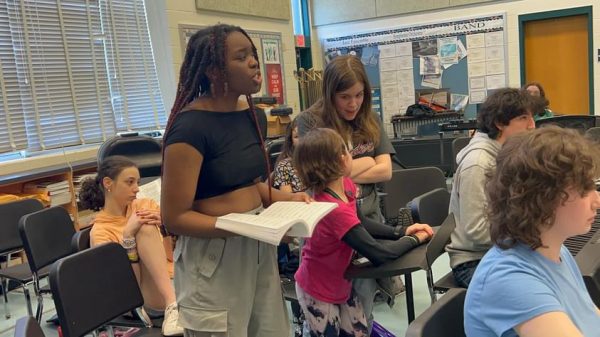Following its spectacular showing of King Lear in early December, WJ STAGE is now preparing for its upcoming spring show: Les Misérables (Les Mis). Based on the book by Victor Hugo, the musical tells a captivating story about social injustice and love, where Jean Valjean, an ex-criminal who, after spending 19 years in jail for stealing a loaf of bread, escapes from prison and plays a game of cat and mouse with Inspector Javert.
Additionally, Jean Valjean’s adopted daughter, Cosette, is caught in a love triangle with revolutionary student Marius and the pining Eponine. Amidst conflict between Jean Valjean and Javert, there is an underlying theme of revolution, as Marius and the other students fight to liberate themselves — and France.
After a 12-year break, Les Mis returns as a WJ production. The decision of the spring show being Les Mis came with the change of performing a fully sung-through musical, meaning that the story is portrayed largely in song instead of dialogue.
“It’s kinda intimidating [to learn all the songs] but it also feels like something that I can learn eventually,” sophomore Ben Kish, playing Jean Valjean, said.
Along with the 10 leads, most of which are double cast, numerous ensemble actors portray various different roles throughout the musical, and are present on the stage, causing the show to resemble real-life scenes.
“The ensemble people play some notable roles throughout the show, but it’s different ones so there’s a lot of characters [because] it goes over a long period of time. [They could be] these factory workers at the start, but at the end, they might be barricade boys. That’s another thing that’s really cool about the show is that the ensemble really helps to build quite an atmosphere,” Kish said.

Due to Les Mis being a sung-through musical, actors have to work closely with the Pit Orchestra, which plays the music while the actors sing. Made up of about 20 people and Andrea Morris, music teacher, Pit Orchestra conductor and producer, the Pit Orchestra has a distinct preparation process.
“Initially, everyone in the Pit learns their parts separate from the actors and the stage crew, but this week, we are doing sitzprobe for the first time where the actors [and] singers will come in and will sing with us with the music. So it’s really important to make sure that we are making the same [musical] decisions so some actors might slow down or speed up at certain parts so that’s really where we haven’t gone yet,” junior and trumpet player Cassia Klein said.
Taking care of all the complicated background aspects of the show, such as audio, the set and the lighting, the stage crew is a significant part of any production, but particularly the ambitious set of Les Mis.
“We’re currently also putting together, at the same time, a lot of our set, and unfortunately, just due to the way that events are, we are not able to fully construct our set as one until after spring break and after all the concerts that occur here. However, we are putting together all the little modular pieces of the set and then constructing those, and then we’ll be able to assemble them come the time,” senior Grace Chulapakorn, Student Technical Director and Stage Manager, said.
Due to the play taking place in the early 19th century, specifically 1815 and 1832, extra attention and work has to be done to ensure the costumes match the storyline and the songs.
“[Costumes] are doing great. We are renting a good amount because it is a lot of period [pieces] and historical costumes but there are a lot of costumes and ensemble pieces that they have to do so it’s a big task but they are definitely doing well,” Student Assistant Director and senior Neena Tavik, who is also playing Eponine, said.
Even with the show’s demanding vocal and orchestral parts, as well as a complicated set, the production is right on track to where it should be and the leaders of STAGE are confident that it will be a spectacular show. Make sure to support the actors, crew and Pit Orchestra by going to see Les Mis on April 21 at 2 p.m. for the Sunday Matinée and April 19, 20, 26 and 27 at 7 p.m.
“At the end [of the day], it’s a story about hope and love and that’s kinda how it ties together,” Tavik said.





































